With generation after generation striving merely to survive, memories of the past grew dim. The population increased somewhat after a thousand years, but civilization itself plunged back to the level of the Middle Ages. Dreading the mutant creatures spawned by radiation and cosmic rays, the humans formed small groups and moved into plains and forests that over the years had gradually returned to verdure. In their struggles with the cruel environment, at times they had to kill their newborn babies to keep what little food they had. Other times the infants went toward filling their parents’ empty bellies.
That was the time. In that pitch-black, superstitious world they appeared. How they—the vampires—kept themselves hidden from the eyes of man and lived on in the luxuriant shadows was unclear. However, their life form was almost exactly as described in legend and they seemed the best suited to fill the role of the new masters of history.
Ageless and undying so long as they partook of the blood of other creatures, the vampires remembered a civilization the human race could not, and they knew exactly how to rebuild it. Before the nuclear war, the vampires had contacted others of their kind who lurked in dark places around the globe. They had a hidden super-power source that they’d secretly developed in fallout shelters of their own design, along with the absolute minimum machinery required to reconstruct civilization after the absolute worst came to pass.
But that’s not to say they were the ones who caused the nuclear war. Through cryptesthesia, the black arts, and psychic abilities mankind never guessed they’d cultivated, the vampires simply knew when the human race would destroy itself and how they, the vampires, could restore order to the world.
Civilization was rebuilt and the tables were turned for vampires and humans.
How much friction and discord that course created between the two sides was soon apparent. Within two thousand years of stepping onto history’s great stage, the vampires gave the world a sprawling civilization driven by super-science and sorcery, dubbed themselves the “Nobility,” and subjugated humanity. The automated city with its electronic brain and ghostly will, interstellar spaceships, weather controllers, methods of creating endless quantities of materials through matter-conversion—all this came into being through the thoughts and deeds of them and them alone.
However, who could have imagined that within five short millennia of this golden age they would be treading the road to extinction? History didn’t belong to them after all.
As a species, the vampires possessed an underlying spark to live that was far less tenacious than that of humans. Or perhaps it would be better to say that their life held an element that ensured their future destruction. From the end of the fourth millennia A.D., the vampire civilization as a whole started to show a phenomenal decline in energy, and that brought on the start of mankind’s great rebellion. Though they had an expertise in the physiology of the human brain, and had developed the science of psychology to such extremes they could manipulate the human mind in any way they chose, in the end they found it impossible to eradicate the innate urge to rebel that lurked in the depths of the human soul.
Weakened by one great uprising after another, the Nobility entered dozens of armistices with the humans, each of which maintained the peace for short periods. But before long the Nobles faded away, like gallant nihilists who realized their destiny.
Some took their own lives, while others entered a sleep that would last until the end of time. Some even headed off into the depths of space, but their numbers were extremely few; in general the vampires had no wish to establish themselves in extraterrestrial environs.
At any rate, their overall numbers were on the decline; ultimately they scattered before mankind’s pursuit. By the time A.D. 12,090 arrived, the vampires served no purpose beyond terrorizing the humans on the Frontier. Yet, precisely because this was their sole purpose, the humans felt a special terror of them that shook their very souls.
To be honest, it was miraculous that mankind was able to plan and execute a rebellion no matter how utterly desperate they might have been.
The horror all felt for vampires—who slept by day and awoke at night to suck the lifeblood from humans and ensure their own eternal life—became part of the vampire mythology, right along with the ancient legends of transformations into bats and wolves, and their power to control the elements. As a result of clever psychological manipulation that continued throughout this mechanized age, the horror laid roots down into the deepest layers of the human psyche.
It is said that the first time the humans signed an armistice with the vampires—their rulers—all the representatives on the human side save one were shaking so badly their teeth chattered. Even though vampires could no longer be found in the Capital, it had still taken the humans nearly three hundred years to check every street and building.
Given how much strength the vampires had in their favor, why hadn’t they set about exterminating the human race? That is the eternal question. It couldn’t be that they were simply afraid of destroying their source of the blood, since they had mastered a method of perfectly synthesizing human blood in the first stage of their civilization. As far as manual labor went, they had more than enough robots to bear the load by the time the revolution broke out. In fact, the reason why they allowed humans to continue to exist in the first place, even in their role as subordinates, is a mystery. Most likely it was due to some sort of superiority complex, or out of pity.
Vampires were rarely seen by humans any more, but the fear remained. On very rare occasions, they appeared from the depths of the darkness and left their vile bite on the pale throats of their victims; sometimes a person would seek them out with wooden stake in hand like a man possessed, while at other times the humans would drive the victim out from their midst, earnestly praying they wouldn’t receive another visit from the vampires.
The Hunters were a product of the people’s fear.
Being nearly indestructible themselves, the vampires weren’t so eager to exterminate the mutant creatures humanity feared so much in the years just after the war. Quite the contrary, the vampires loved the vicious beasts, nurtured them, and even created others like them with their own hands.
Thanks to their unparalleled knowledge of biology and genetic engineering, the vampires unleashed one legendary monster after another into the world of man: werewolves, were-tigers, serpent men, golems, fairies, mer-creatures, goblins, raksas, ghouls, zombies, banshees, fire dragons, salamanders resistant to flames, griffins, krakens, and more. Though their creators neared extinction, the creatures still ran rampant on the plains and in the mountains.
Working the land with the scant machinery the Nobility allowed them, defending themselves with replicas of old-fashioned gunpowder weapons or homemade swords and spears, the humans studied the nature of these artificial monstrosities for generations, learning their powers and their weaknesses. In time, some people came to work exclusively on weapons and ways to kill these things.
Of those people, some specialized in producing more effective weaponry, while those of surpassing strength and agility trained themselves to use those weapons. These exceptional warriors were the first Hunters.
As time went by, Hunters became more narrowly focused, and specialists like the Were-tiger Hunter and Fairy Hunter were born. Of them all, Vampire Hunters were universally recognized as possessing strength and intellect beyond the rest, as well as an ironclad will impervious to the fear their former rulers inspired in others.
The next morning, Doris was awakened by the shrill whinny of a horse. White light speared in through her window, telling her it was a fresh day. She was lying on the bed dressed just as she was when D knocked her out. Actually, D had carried her to the bed when his first skirmish was over. Her nerves had been frayed with worry after her vampire attack, and she was incredibly tense from her search for a Hunter, but when the power of D’s left hand put her to sleep she was totally at peace and had slept soundly till morning.
Instinctively reaching for her throat, Doris recalled what had happened the night before.
What happened while I was asleep? He said we had company, and that had to be him. I wonder how D made out? As she sprung out of bed in a panic, her expression suddenly grew brighter. She was still a little lethargic, but physically nothing else seemed out of the norm. D had kept her safe. Remembering that she hadn’t even shown him where his room was, she pawed at her sleep-disheveled locks and hurried out of her bedroom.
The heavy shades in the living room were fully drawn; at one end of the murky room sat a sofa with a pair of boots hanging off the end.
“D, you really did it, didn’t you? I knew hiring you was the right thing to do!”
From beneath the traveler’s hat that covered his face came the usual low voice.
“Just doing my job. Sorry, it seems I forgot to put the barrier back up.”
“Don’t you worry about that,” Doris said animatedly, checking the clock on the mantle. “It’s only five past seven in the morning. Get some more sleep. I’ll have your breakfast ready in no time. And I’ll make it the best I can.”
Outside a horse whinnied loudly again. Doris was reminded she had a visitor.
“Who the hell would be making such a racket at this hour?” She went over to the window and was about to raise the shade when a sharp “Don’t!” stayed her hand.



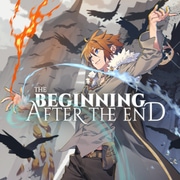

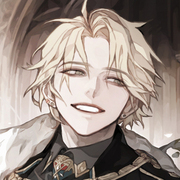
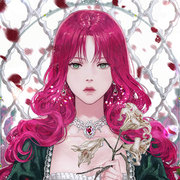



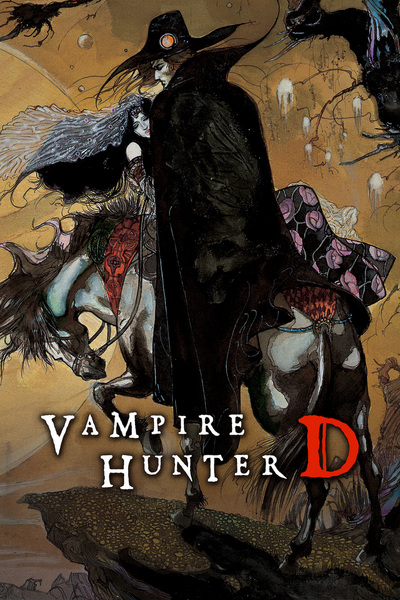
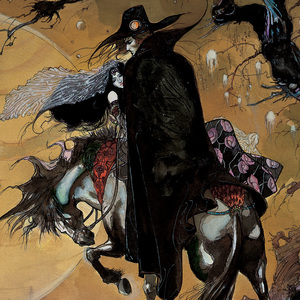
Comments (5)
See all